The Jobi manucode is a species of crow-like bird-of-paradise.
The golden Atlantic tree-rat is a spiny rat species found in Brazil.

The Madagascar partridge is a species of bird in the family Phasianidae. It is widespread across Madagascar. It has been introduced to Réunion.
The black-hooded coucal is a species of cuckoo in the family Cuculidae. It is endemic to Mindoro in the Philippines and is one of the most endangered birds in the country. It is threatened by habitat loss and trapping.

The lowland tiny greenbul, is a species of songbird in the bulbul family, Pycnonotidae. It is found in eastern Africa. Its natural habitats are subtropical or tropical moist lowland forest and subtropical or tropical moist shrubland.

The white-eared catbird is a species of bird in the family Ptilonorhynchidae found on New Guinea and the West Papuan Islands. Its natural habitats are subtropical or tropical dry forest and subtropical or tropical moist lowland forest.

The short-tailed pipit is a species of bird in the family Motacillidae. It is found in Angola, Burundi, Republic of the Congo, Democratic Republic of the Congo, Gabon, Mozambique, Rwanda, Somalia, South Africa, Tanzania, Uganda, Zambia, and Zimbabwe. Its natural habitats are subtropical or tropical dry lowland grassland and subtropical or tropical seasonally wet or flooded lowland grassland.

The piping crow is a species of bird in the family Corvidae. It is endemic to Sulawesi in Indonesia. Its natural habitat is subtropical or tropical moist lowland forest.

The purplish jay is a species of bird in the family Corvidae. It is found in northern Argentina, Bolivia, southern Brazil, Paraguay and southeastern Peru. Its natural habitats are subtropical or tropical dry forest, subtropical or tropical moist lowland forest, and heavily degraded former forest.

The forest fody is a species of bird in the family Ploceidae. It is endemic to Madagascar.

The blue-billed malimbe or Gray's malimbe is a species of bird in the family Ploceidae.

The Boano monarch, or black-chinned monarch, is a species of bird in the family Monarchidae endemic to Indonesia. It is found on Boano island in the southern Mollucas. Its natural habitats are subtropical or tropical moist lowland forest and subtropical or tropical moist shrubland. It is threatened by habitat loss.
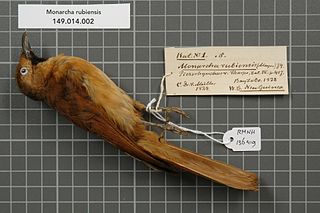
The rufous monarch, or rufous monarch flycatcher, is a species of bird in the family Monarchidae found in western New Guinea. Its natural habitat is subtropical or tropical moist lowland forests.
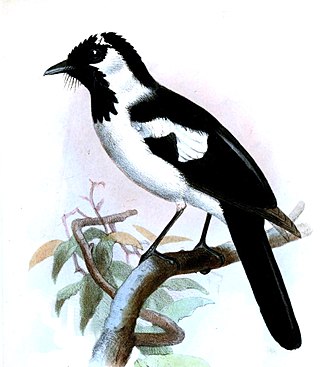
The black-tailed monarch is a species of bird in the family Monarchidae. It is endemic to the Bismarck Archipelago of Papua New Guinea. Its natural habitat is subtropical or tropical moist lowland forests.

The mountain peltops is a species of bird in the family Cracticidae. It is found in Indonesia and Papua New Guinea. Its natural habitats are subtropical or tropical moist lowland forests and subtropical or tropical moist montane forests.
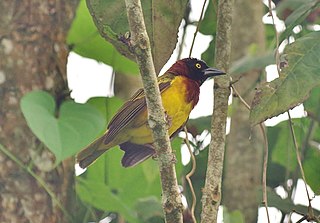
The giant weaver is a species of bird in the family Ploceidae. It is endemic to São Tomé Island. It can climb trees and branches, rather like a treecreeper or sittella. Its natural habitat is subtropical or tropical moist lowland forests.
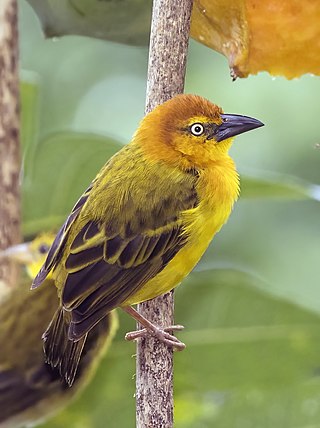
The Príncipe weaver is a species of bird in the family Ploceidae. It is endemic to São Tomé and Príncipe, where it is found on the island of Príncipe. It was described by Charles Lucien Bonaparte in 1851. Its natural habitat is subtropical or tropical moist lowland forests.
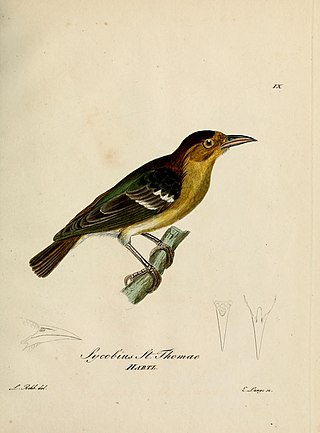
The São Tomé weaver is a species of bird in the family Ploceidae. It is endemic to São Tomé and Príncipe. They are found in the island of São Tomé. Its natural habitats are subtropical or tropical moist lowland forests and subtropical or tropical moist montane forests.

The São Tomé paradise flycatcher, also known as São Tomé flycatcher, is a species of bird in the family Monarchidae. The species was described by Thomas Richard Heywood Thomson in 1842, with Tchitrea atrochalybeia the binomial and Fernando Po given as the type locality. The species is endemic to São Tomé Island. Its natural habitats are subtropical or tropical dry forests and subtropical or tropical moist lowland forests.

Artamidae is a family of passerine birds found in Australia, the Indo-Pacific region, and Southern Asia. It includes 24 extant species in six genera and three subfamilies: Peltopsinae, Artaminae and Cracticinae. Artamids used to be monotypic, containing only the woodswallows, but it was expanded to include the family Cracticidae in 1994. Some authors, however, still treat the two as separate families. Some species in this family are known for their beautiful song. Their feeding habits vary from nectar sucking (woodswallows) to predation on small birds.


















